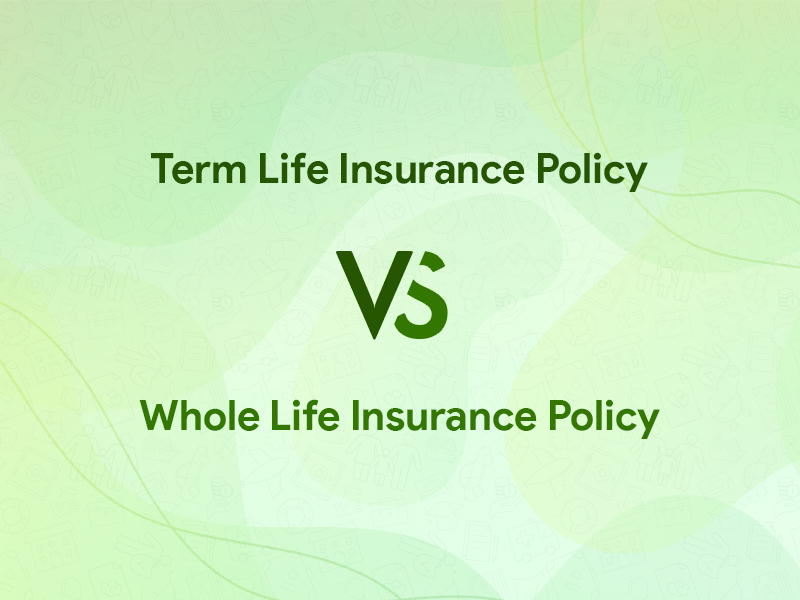
Term vs Life Insurance Policy which is better
Life insurance is a way to safeguard your future. From helping pay off debts to ensuring that you have a comfortable life in the future or when you are old, there are plenty of reasons to buy a life insurance policy from a credible insurance company.
There are two types of life insurance that you can buy – whole life insurance and term life insurance. While the whole life insurance policy covers you for your life, the term life insurance covers you for a fixed-term period. Undoubtedly, the former has a higher and long-term premium, while the latter is much cheaper, and the premium needs to be paid for a specific period.
One of the characteristics that remains the same for both types of life insurance policies is that both come with similar death benefits – the money essentially covers all debt repayments, tax payments, mortgage payments, funeral costs, and other such expenses.
But, what are the differences between the two types? Let us explore the same.
| S. No. | Criteria | Term Life Insurance | Whole Life Insurance |
| 1. | Term period | This is for a shorter period – a fixed preset term period. The term periods usually available are 5, 10, 15, 20, and 30 years. | The policy covers the insured for life. However, before such an insurance policy is bought, there is a qualifying health examination. In case you wish to buy a Whole Life Insurance Policy without a medical examination, the price of the policy is hiked up. |
| 2. | Purpose/Value | The objective of buying this type of life insurance is to protect the dependents or the close family members when the insured person dies prematurely, within the term period. Thus, the value is death benefits only if the person dies within the period. | The value is the death benefit along with the cash value. How? Over a period, say 10 years, the cash starts to accumulate decently. And beyond that, the cash accumulation builds up pretty well to offer financial support to your dependents. |
| 3. | Cost-wise | Term life insurance policies are affordable and quite easy. However, if you wish to take the life insurance policy at an older age, say after 50 years, the premium will be higher. | The premium is expensive, much higher compared to term life insurance policies. |
| 4. | Added benefits | · The life insurance policy can be converted to a whole life insurance policy.
· The term period can be renewed if you wish to extend the coverage. |
· Partial cash can be taken on loan or withdrawn during the policy term.
· The cash accumulation can be considerable if the whole life insurance policy is in force for a good period. |
| 5. | Benefits | Finite term. Simpler policies. Cheap. The policy can be stopped in between. | It is possible to take a loan or withdraw a partial amount. Death benefits are tax-free. Offers protection for life. The best way to build wealth. |
| 6. | Disadvantages | · Limited protection is a big disadvantage.
· This policy cannot be used for building wealth. · In fact, most people tend to spend all the money saved in their lifetime because the term ‘insurance’ has a fixed life term. · If you choose to cover a higher value of death benefit or go in for a longer coverage length, the premium will be expensive. |
· The policy is a lot more complex than term life insurance.
· Costly and can prove to be out of reach for many. · You need to run it for a few years for wealth to build up. · Any loan taken will impact your death benefits. · If the premium is not paid for the first few years or you default, then the policy can get surrendered. |
Choosing between Term Life Insurance and Whole Life Insurance
There are several factors that are considered when you have to choose between term life insurance and whole life insurance.
The factors are:
- Age – this is the first factor that will be factored in;
- Health condition – your existing health condition will be assessed;
- Age of your kids, if any – if you have a family, the age of the children will be assessed;
- What is your financial condition? – Your current earnings will be evaluated by the insurance company. It will also be checked what the financial needs of the user are.
- The existing debt position will be evaluated – the insurance company will assess if you have any debts or mortgages to pay or if there are any plans to take one in the near future.
- You will also be asked about the death expenses that you wish to get covered as part of life insurance.
- Your retirement plans
- Retirement savings plan
- Plans for purchase of real estate and the real estate taxes;
- Your intentions to donate to charity;
- The plans for your kids like school and college fees;
We will contact you as soon as possible, please fill in your details!

Share this post:
Facebook Twitter LinkedIn WhatsApp